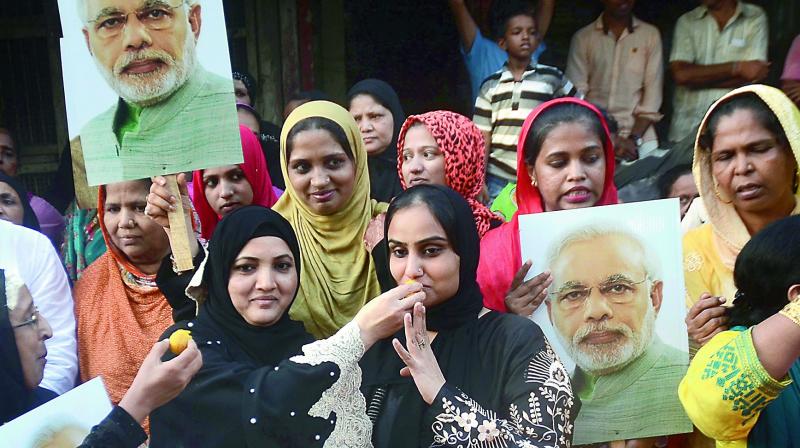SC strikes down triple talaq, says it violates women's basic rights

New Delhi: In a landmark judgement to protect the rights of Muslim women, the Supreme Court on Tuesday banned “triple talaq” or “talaq-e-biddat” (instantaneous divorce by uttering “talaq” thrice in one go), a form of divorce followed by Sunni Muslims for centuries.
A five-judge bench comprising judges from different religions — Chief Justice J.S. Khehar (Sikh), Justices Kurian Joseph (Christian), Rohinton Nariman (Parsi), Uday Lalit (Hindu) and S.A. Abdul Nazeer (Muslim) — by a majority of 3:2 held that “triple talaq” is unconstitutional, manifestly arbitrary and unreasonable to Muslim women. While the majority on the bench struck down “triple talaq” as unconstitutional, the minority stayed the practice of “triple talaq” for six months or till such time Parliament enacts a legislation to regulate marriage and divorce among Muslims.
Triple talaq has no sanction in Quran: SC
Justice Nariman, as part of the majority verdict, said that the Muslim Personal Law (Shariat) Application Act, 1937, is a legislation regulating triple talaq and, hence, can be tested on the anvil of Article 14 (right to equality). Chief Justice Khehar, as part of the minority decision, disagreed with this view.
Justice Joseph, who wrote one of the two majority verdicts, said, “What is held to be bad in the Holy Quran cannot be good in Shariat and, in that sense, what is bad in theology is bad in law as well.”
“Merely because a practice has continued for long, that by itself cannot make it valid if it has been expressly declared to be impermissible,” he said. By implication, even the minority verdict virtually puts on hold the practice of “triple talaq”.
Legal experts said that the Centre is not under any obligation to enact a law to divorce among Muslims, as the bench’s majority judgment striking down “triple talaq” prevails over the minority decision.
In a batch of petitions, Muslim women, including 37-year-old Shaira Bano from Uttarakhand, suffering due to instant “talaq” had challenged the validity of “triple talaq” on the ground that it violated their fundamental right to equality.
The Union home ministry is now preparing to send an advisory to all states asking them to ensure compliance of the Supreme Court order declaring “triple talaq” void.
While the majority judgment of the apex court bench was written by Justice Nariman, for himself and Justice Lalit, Justice Joseph wrote a concurring judgment with Justice Nariman setting aside the practice of “triple talaq”. CJI Khehar wrote a judgment for himself and Justice Nazeer to uphold “triple talaq”.
Justice Nariman said “triple talaq” does not fall within the sanction of Holy Quran. Even assuming that it forms part of the Quran, Hadis or Ijmaa, it is not something “commanded”.

